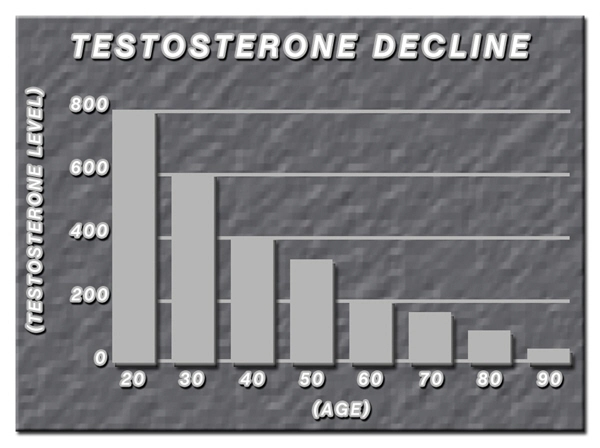Introduction
Depo Testosterone, a brand name for injectable testosterone cypionate manufactured by Pfizer, is widely used in the United States for treating conditions associated with testosterone deficiency in males. While its benefits in improving symptoms of hypogonadism are well-documented, the potential effects on kidney function have garnered significant attention and concern among healthcare professionals and patients alike. This article delves into the relationship between Depo Testosterone and kidney function, providing crucial insights for American males considering or currently using this therapy.
Understanding Depo Testosterone
Depo Testosterone is an intramuscular injection that delivers a sustained release of testosterone, helping to restore normal levels in men with low testosterone. It is commonly prescribed for conditions such as hypogonadism, where the body does not produce enough testosterone. The drug's efficacy in enhancing muscle mass, bone density, and libido is well-established, but its long-term impact on other organ systems, including the kidneys, remains a topic of ongoing research.
Kidney Function and Testosterone
The kidneys play a vital role in filtering waste products from the blood, regulating electrolytes, and maintaining fluid balance. Testosterone, as a hormone, can influence various physiological processes, including those related to kidney function. Studies have suggested that testosterone may affect the kidneys by altering blood flow, influencing the renin-angiotensin system, and potentially impacting the filtration rate.
Research on Depo Testosterone and Kidney Function
Several studies have investigated the effects of testosterone therapy, including Depo Testosterone, on kidney function. A notable study published in the *Journal of Clinical Endocrinology & Metabolism* found that testosterone replacement therapy in men with hypogonadism did not significantly alter kidney function over a 12-month period. However, other research has indicated that high doses of testosterone might lead to increased proteinuria, a potential indicator of kidney stress.
Clinical Observations and Case Studies
Clinical observations and case studies have provided mixed results regarding the impact of Depo Testosterone on kidney function. Some patients have reported no changes in kidney function markers such as serum creatinine and estimated glomerular filtration rate (eGFR) after starting Depo Testosterone. Conversely, there have been reports of transient increases in these markers, suggesting possible kidney strain in certain individuals.
Monitoring and Management
Given the potential for Depo Testosterone to affect kidney function, regular monitoring is essential for patients on this therapy. Healthcare providers typically recommend periodic blood tests to assess kidney function, including measurements of serum creatinine and eGFR. Patients with pre-existing kidney conditions or those at higher risk for kidney disease should be monitored more closely.
Pfizer's Stance on Depo Testosterone and Kidney Function
Pfizer, the manufacturer of Depo Testosterone, acknowledges the importance of monitoring kidney function in patients receiving testosterone therapy. The company's prescribing information for Depo Testosterone includes warnings about potential adverse effects on kidney function and advises healthcare providers to monitor patients accordingly. Pfizer continues to support research into the long-term effects of testosterone therapy on various organ systems, including the kidneys.
Conclusion
While Depo Testosterone offers significant benefits for American males with testosterone deficiency, its potential impact on kidney function warrants careful consideration. Current research suggests that, in most cases, Depo Testosterone does not significantly impair kidney function, but individual responses can vary. Regular monitoring and open communication with healthcare providers are crucial for managing any potential risks. As research continues to evolve, American males on Depo Testosterone can stay informed and proactive in safeguarding their kidney health.
References
- *Journal of Clinical Endocrinology & Metabolism*. "Effects of Testosterone Replacement Therapy on Kidney Function in Men with Hypogonadism."
- Pfizer. "Depo-Testosterone Prescribing Information."
This article provides a comprehensive overview of the effects of Depo Testosterone on kidney function, tailored to the needs and concerns of American males. By staying informed and vigilant, patients can make well-informed decisions about their health and treatment options.

- Depo Testosterone Therapy: American Men's Experiences and Impact on Quality of Life [Last Updated On: March 17th, 2025] [Originally Added On: March 17th, 2025]
- Depo Testosterone: Psychological Impacts on American Men's Mental Health [Last Updated On: March 18th, 2025] [Originally Added On: March 18th, 2025]
- Depo Testosterone: Enhancing Sexual Health in American Men with Low Testosterone [Last Updated On: March 18th, 2025] [Originally Added On: March 18th, 2025]
- Depo Testosterone: Benefits, Risks, and Usage Guidelines for American Males [Last Updated On: March 19th, 2025] [Originally Added On: March 19th, 2025]
- Depo Testosterone: Enhancing American Men's Health Through Hormone Therapy [Last Updated On: March 19th, 2025] [Originally Added On: March 19th, 2025]
- Depo Testosterone: Efficacy, Safety, and Clinical Trials in American Males [Last Updated On: March 19th, 2025] [Originally Added On: March 19th, 2025]
- Tailoring Depo Testosterone Therapy for American Males: Optimizing Health Outcomes [Last Updated On: March 20th, 2025] [Originally Added On: March 20th, 2025]
- Depo Testosterone's Impact on Weight Management in American Males: Recent Studies [Last Updated On: March 20th, 2025] [Originally Added On: March 20th, 2025]
- Depo Testosterone: Accessibility, Insurance, and Steps for U.S. Men's TRT [Last Updated On: March 20th, 2025] [Originally Added On: March 20th, 2025]
- Depo Testosterone: Efficacy, Safety, and Management in Older American Men [Last Updated On: March 21st, 2025] [Originally Added On: March 21st, 2025]
- Depo Testosterone: Managing Chronic Conditions in American Men with Hypogonadism [Last Updated On: March 21st, 2025] [Originally Added On: March 21st, 2025]
- Depo Testosterone: A Comprehensive Guide for Transgender American Males [Last Updated On: March 21st, 2025] [Originally Added On: March 21st, 2025]
- Depo Testosterone Therapy: Enhancing American Male Health and Vitality [Last Updated On: March 21st, 2025] [Originally Added On: March 21st, 2025]
- Depo Testosterone: Boosting Energy and Vitality in American Men with Low Testosterone [Last Updated On: March 22nd, 2025] [Originally Added On: March 22nd, 2025]
- Depo Testosterone: Efficacy and Safety in American Male Veterans with Hypogonadism [Last Updated On: March 23rd, 2025] [Originally Added On: March 23rd, 2025]
- Depo Testosterone: Enhancing Performance in American Male Athletes - Benefits and Risks [Last Updated On: March 23rd, 2025] [Originally Added On: March 23rd, 2025]
- Depo Testosterone: Balancing Hormone Therapy and Fertility Preservation in American Males [Last Updated On: March 23rd, 2025] [Originally Added On: March 23rd, 2025]
- Depo Testosterone's Impact on Blood Sugar Levels in American Males [Last Updated On: March 23rd, 2025] [Originally Added On: March 23rd, 2025]
- Depo Testosterone's Impact on Immune Function in American Males: A Detailed Analysis [Last Updated On: March 24th, 2025] [Originally Added On: March 24th, 2025]
- Depo Testosterone and Hair Loss: Insights and Management Strategies for American Men [Last Updated On: March 24th, 2025] [Originally Added On: March 24th, 2025]
- Securing Insurance Coverage for Depo Testosterone: A Comprehensive Guide for American Men [Last Updated On: March 25th, 2025] [Originally Added On: March 25th, 2025]
- Depo-Testosterone's Impact on Sleep Quality in American Men: Benefits and Challenges [Last Updated On: March 25th, 2025] [Originally Added On: March 25th, 2025]
- Depo Testosterone: Enhancing Cognitive Function in American Males with Low Testosterone [Last Updated On: March 25th, 2025] [Originally Added On: March 25th, 2025]
- Depo Testosterone in Endurance Sports: Benefits, Risks, and Ethical Issues for American Athletes [Last Updated On: March 25th, 2025] [Originally Added On: March 25th, 2025]
- Depo Testosterone: Treating Anemia in American Men with Pfizer's Injectable Therapy [Last Updated On: March 25th, 2025] [Originally Added On: March 25th, 2025]
- Depo Testosterone: Benefits, Liver Risks, and Monitoring for American Men [Last Updated On: March 25th, 2025] [Originally Added On: March 25th, 2025]
- Depo Testosterone: Treating Delayed Puberty in American Males with Pfizer's Solution [Last Updated On: March 25th, 2025] [Originally Added On: March 25th, 2025]
- Depo Testosterone: Impacts on Prostate Health and Monitoring Guidelines for American Men [Last Updated On: March 25th, 2025] [Originally Added On: March 25th, 2025]
- Depo Testosterone: Enhancing Mood and Well-being in American Males with Hypogonadism [Last Updated On: March 25th, 2025] [Originally Added On: March 25th, 2025]
- Depo Testosterone: Enhancing Life for American Male Cancer Survivors [Last Updated On: March 26th, 2025] [Originally Added On: March 26th, 2025]
- Depo Testosterone: Benefits and Risks for American Male Adolescents [Last Updated On: March 26th, 2025] [Originally Added On: March 26th, 2025]
- Depo Testosterone: Managing Skin Effects in American Men [Last Updated On: March 26th, 2025] [Originally Added On: March 26th, 2025]
- Depo Testosterone: Enhancing Life Quality for American Males with HIV/AIDS [Last Updated On: March 26th, 2025] [Originally Added On: March 26th, 2025]
- Depo Testosterone: Dosage, Monitoring, and Adjustments for Optimal Therapy [Last Updated On: March 26th, 2025] [Originally Added On: March 26th, 2025]
- Depo Testosterone: Effective Solution for Low Testosterone-Related ED in American Men [Last Updated On: March 26th, 2025] [Originally Added On: March 26th, 2025]
- Depo Testosterone: Enhancing Libido and Sexual Function in American Men [Last Updated On: March 26th, 2025] [Originally Added On: March 26th, 2025]
- Depo Testosterone: A Potential Treatment for Chronic Fatigue Syndrome in American Males [Last Updated On: March 26th, 2025] [Originally Added On: March 26th, 2025]
- Depo Testosterone: Cardiovascular Risks and Benefits in American Men [Last Updated On: March 26th, 2025] [Originally Added On: March 26th, 2025]
- Depo Testosterone's Impact on American Males' Body Composition and Health [Last Updated On: March 26th, 2025] [Originally Added On: March 26th, 2025]
- Depo Testosterone's Impact on Respiratory Health in American Males: Benefits and Risks [Last Updated On: March 27th, 2025] [Originally Added On: March 27th, 2025]
- Depo Testosterone: Enhancing Fertility in American Males with Low Testosterone [Last Updated On: March 27th, 2025] [Originally Added On: March 27th, 2025]
- Depo Testosterone: Enhancing Muscle Growth and Risks for American Male Weightlifters [Last Updated On: March 27th, 2025] [Originally Added On: March 27th, 2025]
- Depo Testosterone: A Promising Solution for Osteoporosis in American Males [Last Updated On: March 27th, 2025] [Originally Added On: March 27th, 2025]
- Depo Testosterone's Impact on Joint Health in American Males: Benefits and Risks [Last Updated On: March 27th, 2025] [Originally Added On: March 27th, 2025]
- Depo Testosterone: Enhancing Stress Management in American Males with Low Testosterone [Last Updated On: March 28th, 2025] [Originally Added On: March 28th, 2025]
- Depo Testosterone's Role in Diabetes Management for American Males: Benefits and Considerations [Last Updated On: March 28th, 2025] [Originally Added On: March 28th, 2025]
- Depo Testosterone's Impact on Gastrointestinal Health in American Males: A Comprehensive Review [Last Updated On: March 28th, 2025] [Originally Added On: March 28th, 2025]
- Depo Testosterone: Essential Guide for American Males on Hormone Replacement Therapy [Last Updated On: March 28th, 2025] [Originally Added On: March 28th, 2025]
- Depo Testosterone: A Promising Treatment for Depression in American Males [Last Updated On: March 29th, 2025] [Originally Added On: March 29th, 2025]
- Depo Testosterone's Impact on Eye Health in American Males: Risks and Monitoring [Last Updated On: March 30th, 2025] [Originally Added On: March 30th, 2025]
- Depo Testosterone's Impact on Dental Health in American Males: Risks and Benefits [Last Updated On: April 1st, 2025] [Originally Added On: April 1st, 2025]
- Depo Testosterone: Enhancing Thyroid Treatment in American Males [Last Updated On: April 2nd, 2025] [Originally Added On: April 2nd, 2025]
- Depo Testosterone: A Novel Approach to Managing Anxiety in American Males [Last Updated On: April 5th, 2025] [Originally Added On: April 5th, 2025]
- Depo Testosterone: Managing Autoimmune Diseases in American Males [Last Updated On: April 5th, 2025] [Originally Added On: April 5th, 2025]
- Depo Testosterone's Impact on Ear Health in American Males: A Comprehensive Review [Last Updated On: April 5th, 2025] [Originally Added On: April 5th, 2025]
- Depo Testosterone: A Potential Treatment for Insomnia in American Males [Last Updated On: April 7th, 2025] [Originally Added On: April 7th, 2025]
- Depo Testosterone: Impacts on Skin Health in American Males Undergoing TRT [Last Updated On: April 7th, 2025] [Originally Added On: April 7th, 2025]
- Depo Testosterone: Exploring Its Potential in Managing Allergies Among American Males [Last Updated On: April 8th, 2025] [Originally Added On: April 8th, 2025]
- Depo Testosterone: A Promising Treatment for Migraines in American Males [Last Updated On: April 9th, 2025] [Originally Added On: April 9th, 2025]
- Depo Testosterone: Managing Cardiovascular Health in American Males with Low Testosterone [Last Updated On: April 10th, 2025] [Originally Added On: April 10th, 2025]
- Depo Testosterone's Impact on Neurological Disorders in American Males: A Review [Last Updated On: April 11th, 2025] [Originally Added On: April 11th, 2025]
- Depo Testosterone: A Promising Treatment for Chronic Pain in American Males [Last Updated On: April 12th, 2025] [Originally Added On: April 12th, 2025]
- Depo Testosterone: A Promising Treatment for Arthritis in American Males [Last Updated On: April 12th, 2025] [Originally Added On: April 12th, 2025]
- Depo Testosterone's Impact on Respiratory Health in American Males: A Review [Last Updated On: April 13th, 2025] [Originally Added On: April 13th, 2025]
- Depo Testosterone: Managing Endocrine Disorders in American Males [Last Updated On: April 13th, 2025] [Originally Added On: April 13th, 2025]
- Depo Testosterone's Impact on Gastrointestinal Health in American Males: A Comprehensive Review [Last Updated On: April 13th, 2025] [Originally Added On: April 13th, 2025]
- Depo Testosterone's Impact on Hematological Disorders in American Males: Clinical Insights [Last Updated On: April 17th, 2025] [Originally Added On: April 17th, 2025]
- Depo Testosterone: Effects on Male Fertility and Health in American Men [Last Updated On: April 18th, 2025] [Originally Added On: April 18th, 2025]
- Depo Testosterone: Managing Genetic Disorders in American Males - Benefits and Risks [Last Updated On: April 18th, 2025] [Originally Added On: April 18th, 2025]
- Depo Testosterone: Managing Hypogonadism, ED, and BPH in American Males [Last Updated On: April 18th, 2025] [Originally Added On: April 18th, 2025]
- Depo Testosterone: Enhancing Musculoskeletal Health in American Males [Last Updated On: April 18th, 2025] [Originally Added On: April 18th, 2025]
- Depo Testosterone: Managing Metabolic Disorders in American Males [Last Updated On: April 19th, 2025] [Originally Added On: April 19th, 2025]
- Depo Testosterone: Managing Inflammatory Diseases in American Males [Last Updated On: April 19th, 2025] [Originally Added On: April 19th, 2025]
- Depo Testosterone: Managing Low Testosterone in American Males with Renal Disorders [Last Updated On: April 19th, 2025] [Originally Added On: April 19th, 2025]
- Depo Testosterone: A Promising Treatment for Dermatological Conditions in American Males [Last Updated On: April 19th, 2025] [Originally Added On: April 19th, 2025]
- Depo Testosterone's Impact on Psychiatric Disorders in American Males: Benefits and Risks [Last Updated On: April 20th, 2025] [Originally Added On: April 20th, 2025]



List of USA state clinics - click a flag below for blood testing clinics.
Word Count: 621



















































